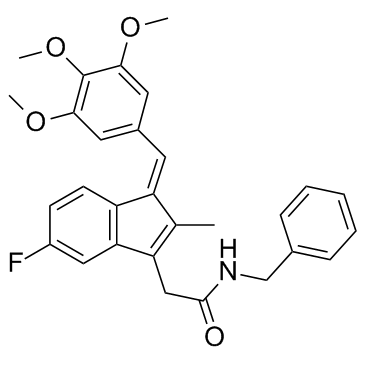200803-37-8
| Name | OSIP-486823 |
|---|---|
| Synonyms | N-Benzyl-2-[(1Z)-5-fluoro-2-methyl-1-(3,4,5-trimethoxybenzylidene)-1H-inden-3-yl]acetamide |
| Description | OSIP-486823 is a novel microtubule-interfering agent with distinct biological effects on both protein kinase G (PKG) and microtubules. |
|---|---|
| Related Catalog | |
| Target |
Microtubule[1] |
| In Vitro | OSIP486823 inhibits growth and induce apoptosis in SW480 human colon cancer cells, with IC50 of 0.1 μM. OSIP-486823 (OSIP486823) causes depolymerization of microtubules in interphase cells, inhibit spindle formation in mitotic cells, and induce multinucleated cells. Exisulind and the potent synthetic derivative OSIP-486823 are members of a new class of drugs known as selective apoptotic antineoplastic drugs that target cyclic guanosine 3′,5′-monophosphate phosphodiesterases (cGMP-PDE). OSIP-486823 also disrupts microtubule polymerization, perturbs mitotic spindle function, and arrests cells in mitosis in human glioma cells[1]. |
| Cell Assay | The SW480 human colon adenocarcinoma and NIH3T3 mouse fibroblast cell lines are seeded in six-well plates at a density of 3×104 per well, grown for 36 to 48 hours, and then exposed to increasing concentrations of each compound (e.g., OSIP-486823; 1, 2 and 4 μM) for 48 hours. Cell numbers are determined using a Coulter counter and results are expressed as a percentage of the control culture. All assays are done in triplicate. Data are analyzed in Excel and the IC50s are determined graphically from cell survival curves[1]. |
| References |
| Density | 1.2±0.1 g/cm3 |
|---|---|
| Boiling Point | 667.3±55.0 °C at 760 mmHg |
| Molecular Formula | C29H28FNO4 |
| Molecular Weight | 473.535 |
| Flash Point | 357.4±31.5 °C |
| Exact Mass | 473.200226 |
| LogP | 5.90 |
| Vapour Pressure | 0.0±2.0 mmHg at 25°C |
| Index of Refraction | 1.607 |
| Storage condition | 2-8℃ |
